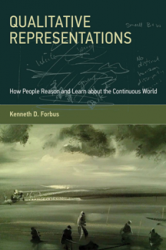 Название: Qualitative Representations: How People Reason and Learn About the Continuous World Название: Qualitative Representations: How People Reason and Learn About the Continuous World
Автор: Kenneth D. Forbus
Издательство: The MIT Press
Год: 2019
Страниц: 441
Язык: английский
Формат: pdf (true), djvu
Размер: 10.1 MB
How we reason about the continuous world around us is one of the central mysteries of cognitive science. This book is based on multiple decades of research in Artificial Intelligence (AI) on qualitative reasoning by my group but also by many others. Most of the qualitative reasoning literature assumes a strong Artificial Intelligence background, which is a shame because I believe it is extremely relevant across cognitive science. This book is my attempt to bridge that gap, to make accessible the insights and ideas that qualitative reasoning research has come up with to a broad audience of cognitive scientists. I hope it will also help AI scientists and engineers better understand the connection between AI and the other branches of cognitive science, because gaining insights across disciplines is why cognitive science exists in the first place.
An argument that qualitative representations - symbolic representations that carve continuous phenomena into meaningful units - are central to human cognition.
In this book, Kenneth Forbus proposes that qualitative representations hold the key to one of the deepest mysteries of cognitive science: how we reason and learn about the continuous phenomena surrounding us. Forbus argues that qualitative representations - symbolic representations that carve continuous phenomena into meaningful units - are central to human cognition. Qualitative representations provide a basis for commonsense reasoning, because they enable practical reasoning with very little data; this makes qualitative representations a useful component of natural language semantics. Qualitative representations also provide a foundation for expert reasoning in science and engineering by making explicit the broad categories of things that might happen and enabling causal models that help guide the application of more quantitative knowledge as needed. Qualitative representations are important for creating more human-like artificial intelligence systems with capabilities for spatial reasoning, vision, question answering, and understanding natural language.
Forbus discusses, among other topics, basic ideas of knowledge representation and reasoning; qualitative process theory; qualitative simulation and reasoning about change; compositional modeling; qualitative spatial reasoning; and learning and conceptual change. His argument is notable both for presenting an approach to qualitative reasoning in which analogical reasoning and learning play crucial roles and for marshaling a wide variety of evidence, including the performance of AI systems. Cognitive scientists will find Forbus's account of qualitative representations illuminating; AI scientists will value Forbus's new approach to qualitative representations and the overview he offers.
Скачать Qualitative Representations : How People Reason and Learn About the Continuous World
|